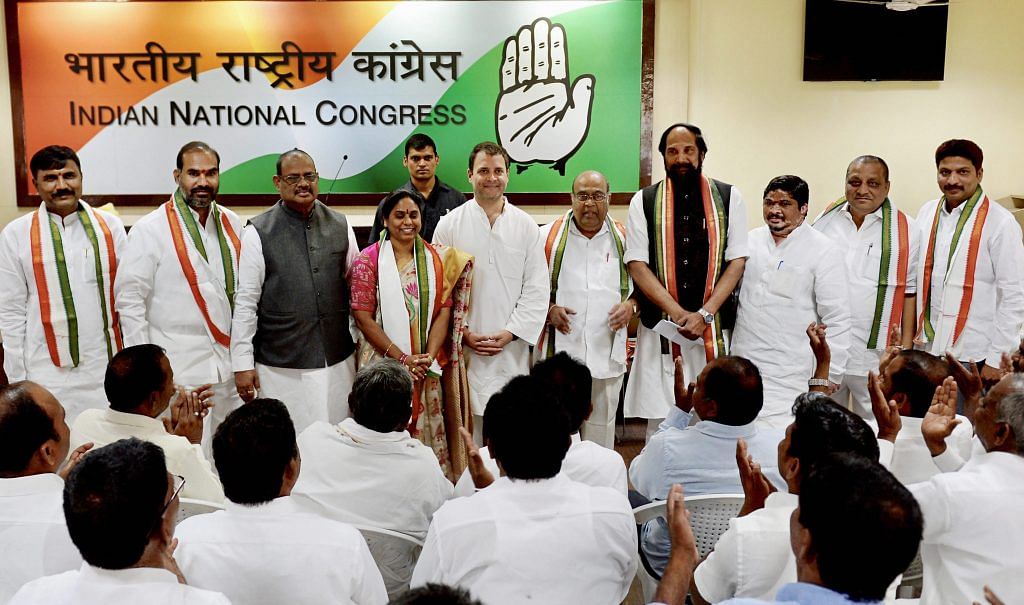There’s a clear message for Congress from Telangana — vote-share arithmetic does not always translate into poll victory.
New Delhi: The assembly election results Tuesday sent out a clear message to the proponents of the proposed mahagathbandhan or grand alliance of opposition parties: That sound arithmetic does not perforce performance in politics.
To put it simply, just adding the vote-shares or vote-banks of different parties is not always a winning formula.
The Congress may have reasons to celebrate its success — as per trends, it is dislodging the BJP from at least two states, the first time in five years, excluding Punjab where SAD-BJP coalition was in power.
But its failure in Telangana will put a question mark on the very logic behind its efforts to forge an alliance of parties.
Tottering in Telangana
In Telangana, two of the strongest proponents of the grand alliance — the Congress and the TDP — came together with the CPI and the Telangana Jan Samiti.
But they have failed to dislodge the Telangana Rashtra Samiti (TRS) from power, highlighting the ‘inherent contradictions’ in the opposition alliance comprising the two parties that are arch-rivals in Andhra Pradesh.
The combined vote-share of the Congress and the TDP in Telangana assembly election in 2014 was around 6 per cent more than that of the TRS, which had secured 34 per cent in the last elections. And that logic had driven the Congress-TDP tie up.
But as the trends indicate, the alliance is set to finish a distant second to the TRS in India’s youngest state.
Also read: Welcome to Freebiestan, also known as KCR’s Telangana
A lesson in Chhattisgarh
In Chhattisgarh, the alliance between Ajit Jogi’s Janta Congress Chhattisgarh and Mayawati’s Bahujan Samaj Party (BSP) may secure a few seats as the trends suggest.
The BSP may have hurt the Congress on a few seats in Madhya Pradesh and Rajasthan, too. But Jogi’s and Mayawati’s relative success doesn’t necessarily make the mahagathbandhan an ineluctable option for the Congress even though its vote-share, if combined with that of these two parties, could have given it more seats in all these states.
The counterpoint here is that, unlike many other states, the BJP also had a support base among Dalits and tribals, the mainstay of the above-mentioned alliance, in both Chhattisgarh and MP.
It is difficult to deduce from the initial trends on which of the two principal parties — the BJP and the Congress — Mayawati and Jogi hurt more.
In Rajasthan, the Congress could have been much better placed without its rebels who played spoilsport on many seats.
More importantly, the results in Chhattisgarh showed that the Congress, when pitted against the BJP as its principal challenger, has the potential to make up for the reduction in its vote-bank that parties such as the BSP could eat into.
Also read: Exit polls were spot on when Telangana, Rajasthan, MP, Mizoram & Chhattisgarh last voted
The case for going it alone
If one were to factor in the advantages of consolidating the common vote-banks against the BJP, there is also the disadvantage of the next Lok Sabha elections turning into a contest between Modi and the rest comprising parties with conflicting interests.
Telangana elections serve as a perfect example in this context.
Therefore, if given the option of contesting just 2-3 Lok Sabha seats in Uttar Pradesh as desired by the SP-BSP leadership, the Congress could also decide to go alone in UP hoping to replicate 2009 results when it secured 21 of the 80 Lok Sabha seats.
Even without the Congress, the SP-BSP-RLD alliance could be potent enough — at least arithmetically — to damage the BJP in UP to achieve the commonly stated objective of the opposition parties.
Given that the Congress’ state-specific alliances in most states are almost agreed upon — with DMK in Tamil Nadu, NCP in Maharashtra, RJD in Bihar, NC in Jammu & Kashmir, and JD(S) in Karnataka, among others — the mahagathbandhan as commonly perceived and defined hinges on the finalisation of proposed alliances in Uttar Pradesh, Andhra Pradesh, West Bengal, and Delhi. The Congress party’s experience in Telangana may force it to re-visit its mahagathbandhan strategy.
Post-Tuesday, therefore, the Congress may not be inclined to yield to the SP-BSP leadership’s attempt to reduce it to the status of a fringe player in UP. But the scenario could be different if the grand old party were to depend on the BSP to come to power in Rajasthan or MP, as suggested by trends Tuesday afternoon.
